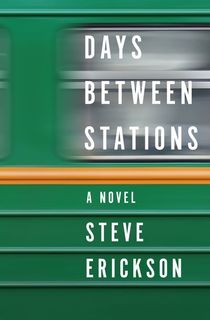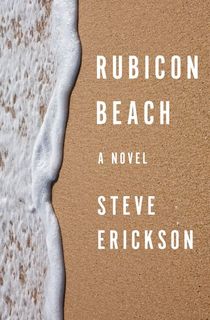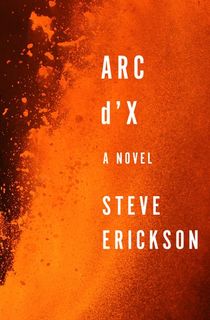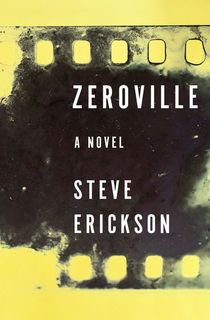Steve Erickson is a renowned American author. His unique style of surrealism has not only set him apart from the mainstream, but also has earned him widespread recognition. Weaving together captivating stories, powerful motifs, and vivid imagery, Erickson has "a mind that can both conceive visions and follow them over the edge" (Michael Ventura).
Erickson published his first novel Days Between Stations in 1985 and has continued to write ever since. He has authored a total of ten novels—his most recent book, Shadowbahn, was published in 2017. Filled with decades of legendary music, Shadownbahn centers on the reappearance of the fallen Twin Towers in the Dakota Badlands.
Erickson's thought-provoking novels have earned him multiple awards, including the American Academy of Arts and Letters Award in Literature and the Lannan Lifetime Achievement Award, as well as honors such as the John Simon Guggenheim Foundation fellowship and a National Endowment for the Arts grant.
Recently, Early Bird Books reached out to Steve Erickson to discuss his work and his views on writing and literature. Read the full interview with Erickson below.
Shadowbahn, like many of your novels, explores America and what it means to be American. What do you hope to impart to an American audience reading your novels?
Shadowbahn opens with the sudden reappearance in the Dakota Badlands of the Twin Towers, twenty years after having gone down in the attacks of 9/11. As with a lot of my novels, I myself am not entirely sure at the outset what a particular image or piece of narrative circumstance means, but soon in the writing of this novel, duality presented itself as a pretty obvious theme, particularly an American duality that, in a way, has always existed.
We begin to see in the novel that there are twin Americas, and in the case of Shadowbahn the country literally has divided into two socially and politically, with a young white brother and his Black sister driving across the country; having to weave and dodge certain occupied hostile territories. And as your question indicates, this is an ongoing motif in a number of my novels, including Rubicon Beach, Arc d’X, Our Ecstatic Days and These Dreams of You.
As it happens, I finished the first draft of Shadowbahn in the summer of 2015, the same month that Donald Trump first announced his presidential candidacy, which nobody took seriously at the time. But Trump didn’t create Trumpism—it was the other way around, and the division has been clear for at least thirty years; or maybe it’s been clear a lot longer than that, since the beginning, since the people who created the country had to kick down the road the can of slavery, which is to say the meaning of America was critically compromised before there was an America, and the American promise was broken before it was made.
Something has been wrong in the American conception from the beginning, and for that conception to prevail we’re going to have to come to terms with its fundamental flaw in a way we thought we had with a Civil War that, a century and a half later, it’s not clear ever really ended.
You have often talked about the relationship between personal experience and imagination in your writing, and in fiction more broadly. Have you found the relationship between the two to shift over the course of your career?
I think what I found over time was just how symbiotic the two are. The imagination is informed by experience, and experience is refracted through the prism of the imagination. I suppose it’s a bit like dream interpretation—you make up something and then realize at some point it didn’t arrive out of the blue; it came through the portal of something that actually happened. Or the other way around: my first novel, Days Between Stations, was conceived as a love story, based on a relationship I had. But by the time I was done writing the book, it had become something else for which that true experience remained the molecule at the core.
In the case of Shadowbahn, those two kids crossing the country are based on my own white son and Black daughter, but at some point in the story they become their own characters. So the relationship between imagination and experience doesn’t so much shift as blur.
Given your experience studying film at UCLA and writing as a novelist, how do you view books in relation to other forms of media? What makes literature special to you?
Well, I grew up in a time when movies and music were more engaging creative forms than most contemporary fiction. But even in my early twenties as I was coming to terms with movies being the art form of the century and flirting with the idea of being a filmmaker, ultimately I realized that, in not just talent but temperament, I was cut out to be a writer. I was cut out for the solitude of it, as opposed to film which, no matter how much an auteur you are, is inevitably collaborative.
Fiction is special to me in that the only one I’m collaborating with is the reader. It offers a private world to both writer and reader—and not necessarily the same world even when it’s the same book—where movies can’t go. In its subjectivity, fiction is probably closer to music.
Related: 17 Book to Movie Adaptations Streaming on Netflix Now
Are there any changes would you like to see in the literary world?
I would like to see young writers taking more chances. I would like to see them engaging the world more than just their own private psychodramas, given where the world is at and its current peril. Believe me, there’s lots of psychodrama in my own work—in no way am I proposing a more sociological fiction, but I am proposing a fiction that fuses the social with the personal.
I see lots of young fiction these days that’s highly solipsistic and focused almost exclusively on memoirist perspective. I’m not arguing for abandoning that—I don’t think writers could. It’s part of what makes them write. But I am arguing for expanding it.
Is there a book that you think everyone should read?
I don’t have one answer for that, but I can narrow it down to a few. I think One Hundred Years of Solitude is arguably the great novel of the second half of the Twentieth Century. I think Wuthering Heights is the most underrated “classic” novel, misunderstood because everyone who hasn’t read it but is familiar with the story assumes it’s simply a gothic romance, when in fact Emily Brontë was anticipating the psychological fiction of Dostoevsky and the ecstatic surrealism of Baudelaire. She was a revolutionary in a way I’m not sure she’s ever gotten credit for—I’m sure sexism has absolutely nothing to do with that whatsoever, right? (The novel originally was published under a gender-neutral pseudonym.)
Finally, these days in particular people should read The Rise and Fall of the Third Reich and remember that Hitler was elected by a plurality and rose through democratic channels that he then leveled once they served his purpose. If that doesn’t sound at least a little familiar, then people aren’t paying attention, which is how these things happen in the first place.
Steve Erickson Books

Days Between Stations
Erickson's debut novel, Days Between Stations, centers on a couple who fell in love when they were young, but now seek comfort in others. Erickson follows the love triangle that develops between the unique characters, pulls in the discovery of an old film masterpiece, and incorporates epic weather events to create a memorable and searing story.

Rubicon Beach
Rubicon Beach tells a story of converging lives in a dystopian world. The novel follows the journeys of Cale, a recently released political prisoner leading a numbing life, but given a cryptic message; Catherine, a South American who finds her way to a Hollywood screenwriter; and Jack Mick Lake, who is fixated on numerology.

Arc d'X
Beginning with Sally Hemings and Thomas Jefferson relationship, Arc d'X travels to different places, times, and realities to delve into "the pursuit of happiness," and all the famous phrase entails.

Zeroville
Zeroville follows a Vikar, a young architect, who arrives in Hollywood and becomes wrapped up uncovering and splicing together a mysterious film, whose frames are hidden in the reels of every movie ever made. Both surreal and energizing, Zeroville was adapted into a film starring James Franco and Seth Rogan.

Shadowbahn
Guided by music, Shadowbahn tells the story of two siblings on a road trip, which leads them toward the newly reappeared Twin Towers that have mysteriously emerged in the Dakota Badlands.

